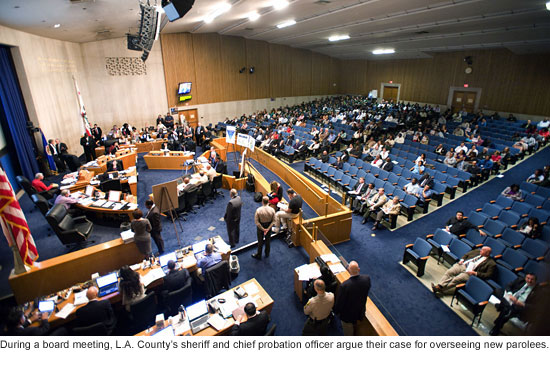The sheriff vs. the probation chief
July 12, 2011
 Two of Los Angeles’ most powerful criminal justice agencies faced off Tuesday during an extraordinary meeting of the Board of Supervisors, each arguing that they’d be better equipped to handle the surge of parolees who’ll soon be flowing into the county as a result of the state’s budget crisis.
Two of Los Angeles’ most powerful criminal justice agencies faced off Tuesday during an extraordinary meeting of the Board of Supervisors, each arguing that they’d be better equipped to handle the surge of parolees who’ll soon be flowing into the county as a result of the state’s budget crisis.
Under Gov. Brown’s “realignment” spending plan, California’s counties are being given responsibility for overseeing thousands of low-level state prison inmates who will be released to ease prison overcrowding and to save money. Although the state has agreed to provide funding to the counties for the first year, there are no guarantees beyond that.
Virtually everywhere else in the state, county probation departments have been tasked with these new duties, which are similar to those they already perform. But in Los Angeles, Sheriff Lee Baca has offered a novel and controversial proposal, contending that the public safety mandate of his department should be broadened to include the rehabilitative work of parole supervision.
On Tuesday, Baca took on Los Angeles County’s Chief Probation Officer Donald Blevins, who argued that his agency is not only more qualified to oversee the new parolees but that it can do so at a better price for taxpayers. The Board of Supervisors’ hearing room was crowded largely with Probation Department supporters.
The supervisors, who had strongly opposed Brown’s realignment proposal, challenged the two agency leaders to defend the content and cost of their proposals. Some expressed concerns that neither department—both of which have come under federal scrutiny for facets of their operations—could deliver on its promises. Several supervisors suggested that a hybrid of the two agencies should be considered. In the end, the board asked the Chief Executive Office to report back with an analysis of the competing proposals.
Critics of Baca’s bid contend that the Sheriff’s Department has no institutional expertise in overseeing parolees, a job more akin to social work because of its emphasis on reintegrating ex-prisoners into society. But the sheriff pointed to his record as a leading advocate for inmate rehabilitation and his department’s success in working with community-based re-entry programs.
“My department has the largest education-based incarceration program in the nation,” he said.
At the same time, Baca argued that the reach of his department could help protect the public from problems that might arise from such a large number of former inmates suddenly returning to live in Los Angeles County.
“This is a seven-day-a-week, 24-hour-a-day problem, and therefore resources must be dedicated to ensure that felons in the system understand we have the capacity to supervise them any time, any place, any time relative to the week,” Baca said.
Chief Probation Officer Blevins, for his part, acknowledged that his department has been plagued by problems in its juvenile camps. But he emphasized that it has an excellent record in supervising adults, many of whom are ex-felons and account for more than 70% of the department’s workload.
“We have a proven track record of working with this population,” Blevins said. Moreover, he said, the Probation Department could better comply with a legal mandate encompassed in the state legislation requiring the county to use “evidence-based” practices to reduce recidivism among state parolees. One probation program for probationers aged 18-25 at a county day reporting center has cut recidivism from 39% to less than 22%, he said.
The Probation Department’s plan, he said, “does not focus on suppression and incarceration over rehabilitation…It does not complicate and confuse the clients in terms of the roles and responsibilities of officers. It does not require building, learning and training to a brand new infrastructure that potentially can take years to implement and operate efficiently.”
Although the supervisors did not vote on the matter, several seemed openly wary of Baca’s plan, especially given its higher one-year cost estimate–$37 million versus $28 million for the Probation Department.
Supervisor Zev Yaroslavsky, for one, suggested that the board might not even be considering Baca’s proposal were it not for his reputation as one of law enforcement’s most forward-thinking figures.
“You’re unique, Lee,” the supervisor said told the sheriff. “The only reason this has been given the time of day is because you’re proposing it. If this had come from just about anybody else in law enforcement, I don’t think it would have been given serious consideration.”
Posted 7/12/11












 405 bridge work causes a stink
405 bridge work causes a stink
